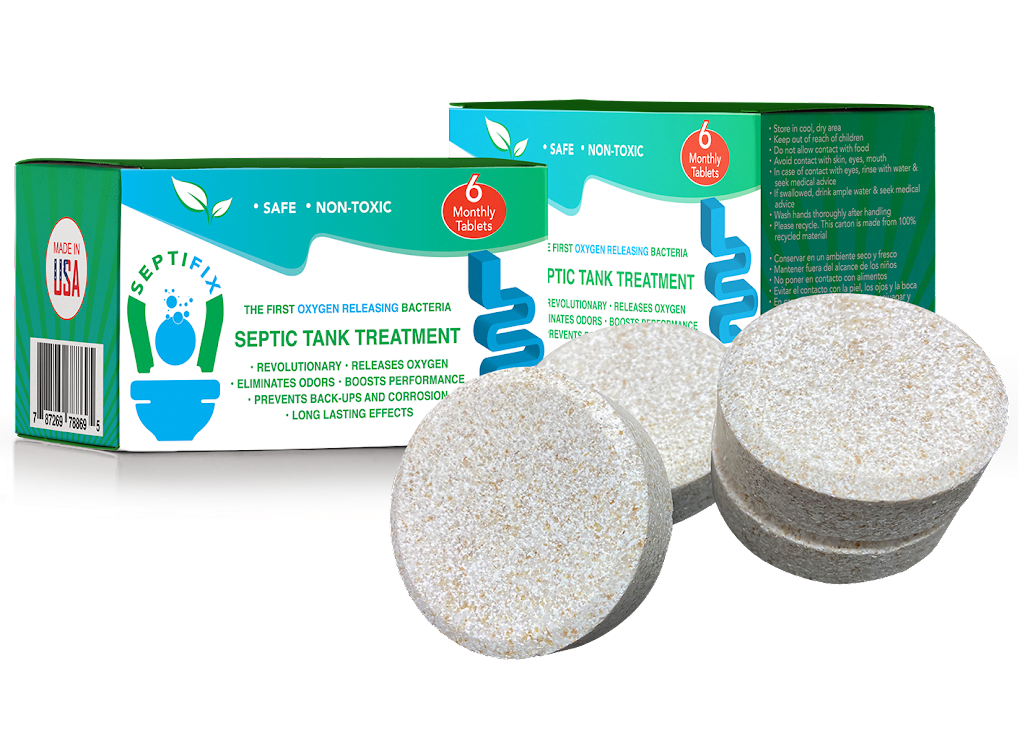There are some common causes and solutions for septic tank smell in your house. I hope this information helps you solve your problem and eliminate the odor.
Possible Problem #1: Insufficient Bacteria
This can be a sign of a problem with your septic system that needs to be addressed as soon as possible. Here are some possible causes and solutions for the septic tank smell:
One of the possible reasons why your septic tank smells like sewage is that it does not have enough bacteria to break down the organic waste. Bacteria are essential for properly functioning your septic system, as they decompose the solid and liquid waste and reduce the odor. They also help prevent the accumulation of sludge and scum in your tank, which can cause clogging or overflowing. Without enough bacteria, your septic tank may not be able to treat the wastewater effectively and may release harmful substances or gases into the environment.

SEPTIFIX will save you hundreds, if not thousands of dollars each year, because your septic system will run smoothly and you won’t have to worry about calling the pumpers or a plumber for a fix!
Click here to save up to 50%
The bacteria population in your septic tank may be low for various reasons. For example, if your septic tank has been recently installed or pumped out, it may take some time for the bacteria to grow and multiply in the new or empty environment. Alternatively, using harsh chemicals or antibiotics in your household may kill or inhibit the bacteria in your tank. Moreover, if you flush non-biodegradable items or too much water into your septic system, they may interfere with the bacterial activity or dilute their concentration.
You can add bacteria additives to restore the bacteria population in your septic tank. Bacteria additives contain living or inactive bacteria that can boost the natural decomposition process in your septic system. You can find different bacteria additives in the market, such as powders, liquids, tablets, or packets. You can follow the instructions on the product label to determine how much and how often to add them to your tank.
Once you add bacteria additives to your septic tank, you should notice a difference in the smell and performance of your septic system. The bacteria additives will help break down the organic waste and reduce the odor. They will also help improve the quality of the effluent and prevent clogging or overflowing. However, it would help if you did not rely solely on bacteria additives to maintain your septic system. You should also follow other best practices, such as avoiding flushing harmful substances or items, using water efficiently, and pumping out your tank regularly.
Possible problem #2: Your septic tank is too full
Another problem when your septic system smells like sewage is that your tank may be too full and need to be pumped out. A full septic tank can cause the sewage to back up into the pipes or overflow into the drain field, creating a foul odor. This can also damage your plumbing system, contaminate your groundwater, and pose health risks for you and your family.
It would help if you had your septic tank pumped out every 3 to 5 years, depending on the size of your tank and the number of people in your household. The average cost of septic tank pumping in the US is about $400, but it can vary depending on your location, tank size, and service provider.
You can contact a septic system professional to pump out your tank and inspect it for any damage or leaks. They will also check the condition of your drain field, baffles, filters, and pipes and advise you on maintaining your septic system properly. Pumping out your septic tank regularly is one of the most important steps to prevent septic tank smell and other problems.
Possible problem #3: Damage to the septic tank
If your septic tank smells like sewage, the next problem is that it may have a damaged or loose cover, allowing the sewer gases to escape. Sewer gases, such as methane, hydrogen sulfide, and carbon dioxide, can be harmful or even explosive if they accumulate in high concentrations. They can also cause unpleasant odors, headaches, nausea, or respiratory problems for you and your family.
You should check your septic tank’s cover and ensure it is securely fastened and sealed. The cover is usually made of concrete, metal, or plastic and has a handle or a lid that can be lifted for inspection or pumping. It should fit snugly on the tank’s opening and prevent air or water from entering or leaving the tank.
If the cover is cracked or broken, replace it with a new one as soon as possible. You can contact a septic system professional to help you find and install a suitable cover for your septic tank.
You can also temporarily use sealants or caulks to fix minor cracks or gaps in your cover. However, you should not use any flammable or toxic materials, as they may react with the sewer gases and cause a fire or an explosion. Replacing or repairing your septic tank cover is one of the easiest ways to prevent septic tank smell and other hazards.
Possible problem #4: Plumbing vent clogged or frozen
The 4th problem when your septic tank smells like sewage is that the plumbing vent on your roof may be clogged or frozen, preventing the sewer gases from venting out.

SEPTIFIX will save you hundreds, if not thousands of dollars each year, because your septic system will run smoothly and you won’t have to worry about calling the pumpers or a plumber for a fix!
Click here to save up to 50%
The plumbing vent is a pipe that extends from your septic system to your roof, allowing sewer gases to escape into the atmosphere. It also helps regulate the air pressure and water flow in your pipes, preventing siphoning or gurgling noises. If the vent is blocked by debris, snow, ice, or animals, sewer gases can build up in your pipes and create a bad smell.
Sewer gases can also corrode pipes and fittings, damage appliances, and pose health risks for you and your family. You should clear any obstructions from your plumbing vent and ensure it is not damaged.
To clear your plumbing vent, you can use some of these methods:
- Use a ladder to access your roof and locate your plumbing vent. A black or white pipe sticks out of your roof near your bathroom or kitchen. Be careful not to damage your roof or fall off the ladder.
- Use a flashlight to inspect the opening of your plumbing vent and see if there is any visible blockage. If there is, use a pair of gloves and a tool such as a screwdriver, pliers, or wire hanger to remove it. You can also use a hose or a bucket of water to flush out any debris or ice from the vent.
- Use a plumber’s snake or an auger to clear any clogs inside your plumbing vent. Insert the snake or auger into the vent and push it until you feel resistance. Then, twist and pull it back and forth to break up the clog. Repeat this process until you clear the vent.
- Use a garden hose or a pressure washer to spray water into your plumbing vent. This can help loosen stubborn clogs or ice and flush them out of the vent. Be careful not to use too much pressure or water, which can damage your pipes or cause flooding.
- Use a hair dryer or a heat gun to melt any ice in your plumbing vent. Hold the device near the vent’s opening and apply heat until the ice melts. Be careful not to burn yourself or your roof.
To prevent future clogs or freezing in your plumbing vent, you can use some of these tips:
- Install a cap or a screen on your plumbing vent to keep out debris, snow, ice, or animals. Ensure the cap or screen has enough holes to allow airflow and does not restrict the venting function.
- Insulate your plumbing vent with foam or fiberglass to prevent freezing in cold weather. You can also wrap heat tape around it and plug it into an outlet to keep it warm.
- Use any of the methods above to clean your plumbing vent regularly. You can also check your plumbing vent for any signs of damage or corrosion and repair or replace it if needed.
Conclusion when your septic tank smells like sewage:
Your septic tank smell problem may have different causes and solutions depending on the condition of your septic system and the factors that affect it. First, if your septic tank smells like sewage, you should inspect your septic system for any damage or leaks and contact a septic professional if you need any assistance.
If the system is not damaged, restore your septic tank’s bacteria population.
Doing these things can prevent future problems and protect your health and the environment.
Need help with your Septic Tank? Fill out this form:


